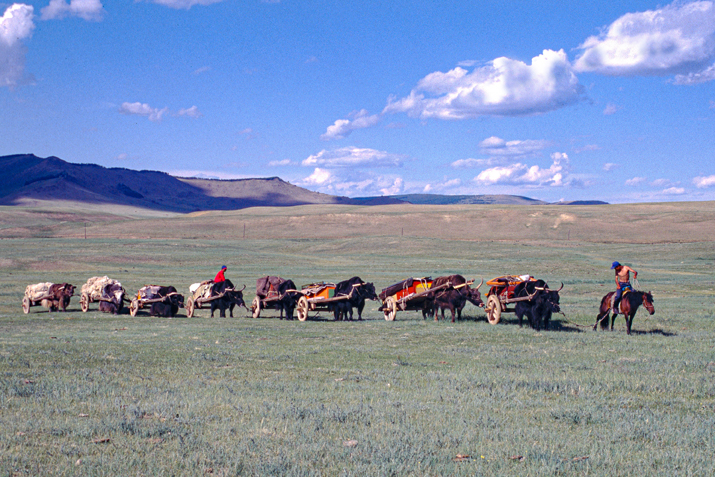
Hunger
N 49°34'524'' E 100°27'430''
Day: 65
Sunrise:
07:11
Sunset:
19:07
As the crow flies:
24
Daily kilometers:
31
Total kilometers:
751
Soil condition:
Stones/gravel
Temperature – Day (maximum):
5°C
Temperature – day (minimum):
minus 2°C
Temperature – Night:
minus 7°C
Latitude:
49°34’524”
Longitude:
100°27’430”
Maximum height:
1730 m above sea level
Time of departure:
10:15
Arrival time:
17:45
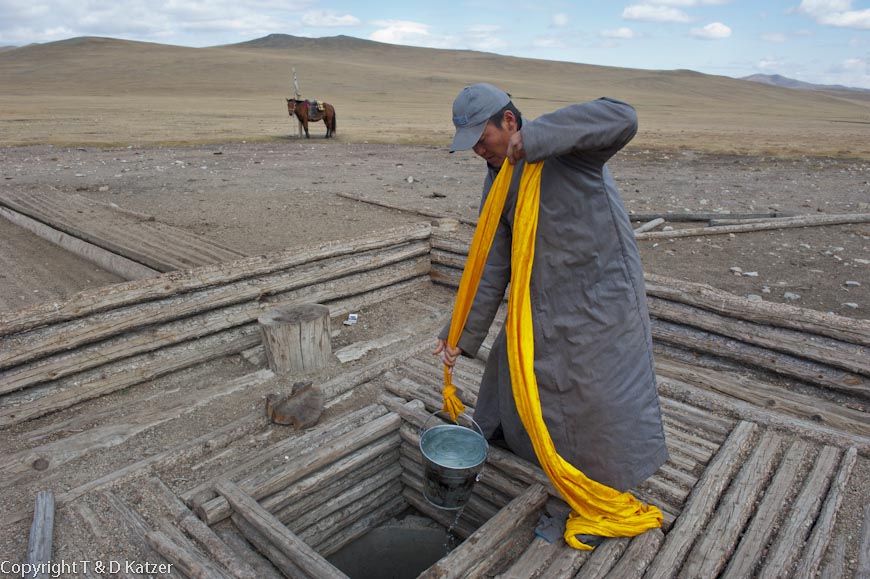
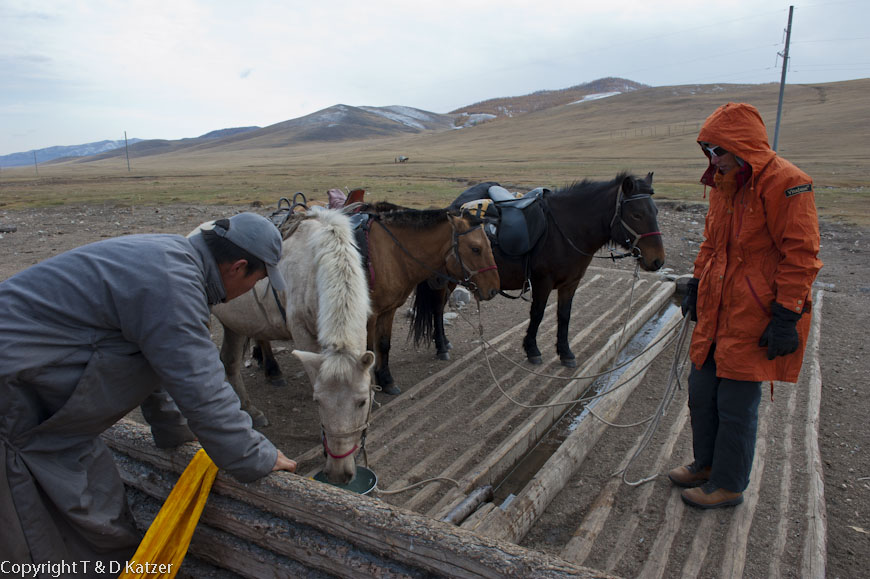
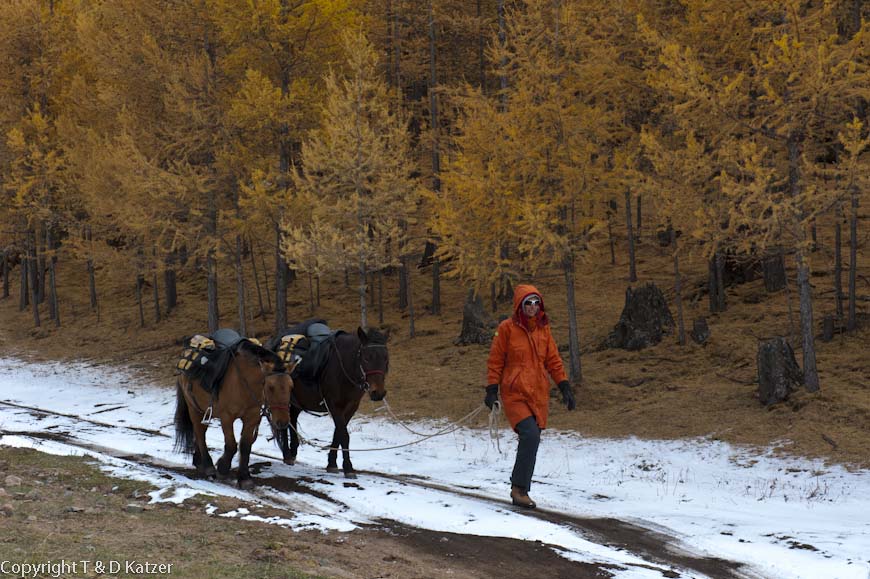
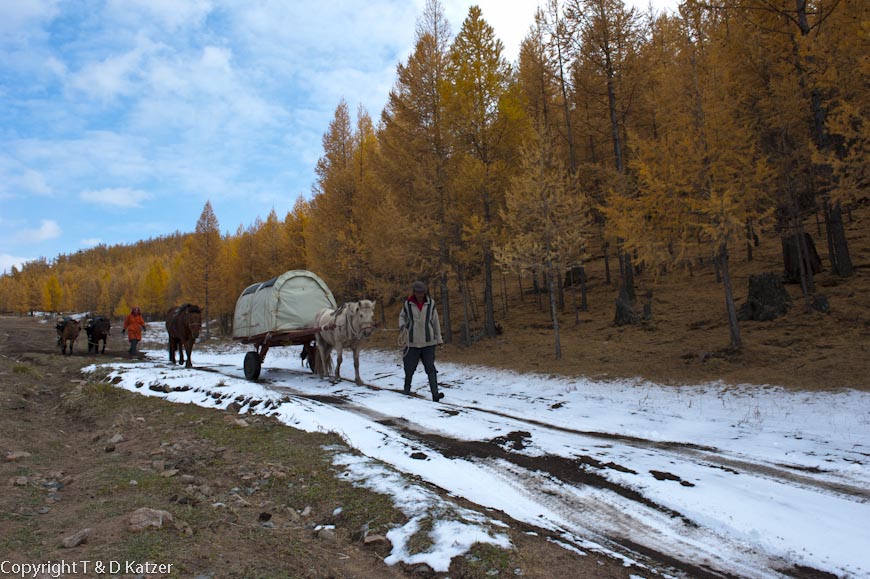
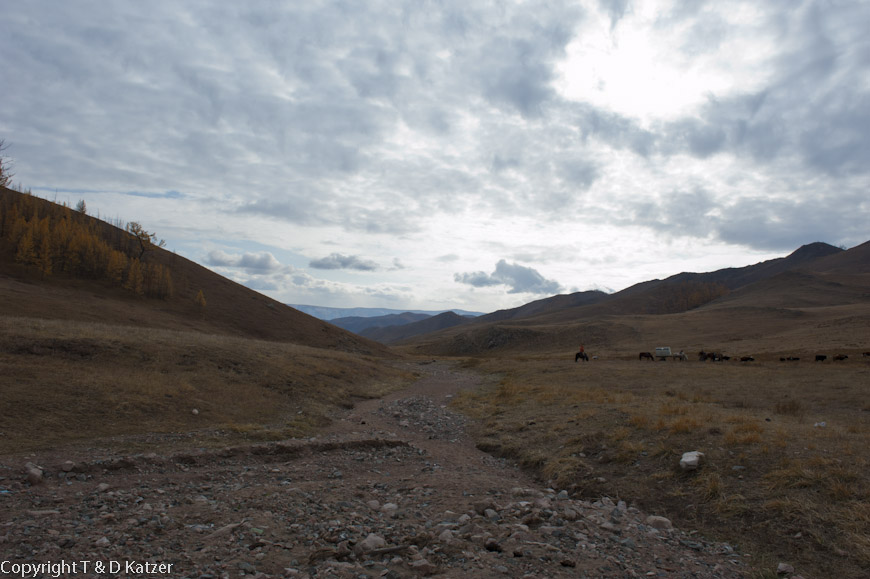
It is still cloudy this morning. An icy cold wind blows down from the mountains and makes us shiver. We decide to break camp and move on. As soon as we have the first kilometer behind us, the path slowly climbs. We approach another pass at a leisurely but steady pace. At a man-made drinking trough, we fetch water bucket by bucket from the depths to water our horses. We are surprised how little they eat. “Obviously too cold to drink,” I joke. At an altitude of 1,730 meters, we again come across the residence of the patron deities, the Ovoo. “Should we stop for lunch?” Bilgee asks me. “Far too cold up here. Let’s find a place down in the valley,” I reply. Bilgee Bor carefully guides you down the washed-out gravel path. It takes a lot of strength for the draft horse to brake the heavy wagon. It is already 3 p.m. when I find a suitable place for our rest. We position the car at right angles to the wind. I quickly stretch the tarpaulin in front of it behind which we find shelter from the cold blast. “Do we only have cookies?” I ask, famished like a wolf. “Yes, unfortunately,” answers Tanja. A little envious, I watch our men still feasting on their disgusting-looking sheep’s head. While my stomach growls and refuses to eat sweet stuff, Bilgee bites into one of the thin sheep legs and tears off a few tendons and some fat with his teeth. “Another day like this and I’ll find such an ugly head and such a stilt leg delicious too,” I say to Tanja in a very serious tone. For vegetarians and semi-vegetarians like me, energy is in short supply as the days get colder. Hunger is a bad thing. Although I have experienced many expeditions in the last 25 years, I cannot remember such hunger as here. We eat regularly, but the energy content of a bowl of muesli in the morning doesn’t last long. Especially not when you’re riding over mountain passes and trotting in the saddle for hours on end in o° degrees and very cold winds. Although we are in the middle of Mongolia, I can’t help but think of starving people in Africa or other places on our planet. People who have no more to eat than a small bowl of rice or less a day. What a sissy I am when I only get cookies after six hours and think I can hardly stand it because I’m so hungry. Above all, I am surprised at myself. I feel anger welling up inside me even though no one has annoyed me. I would never want to experience being shipwrecked and drifting across the sea in a small nutshell without food and without knowing when there will be something to eat again. I remember a documentary in which four survivors experienced this. When they could no longer stand the hunger, they agreed to draw lots to decide which of them would die so that the other three could survive. It hit a young man who was then killed by the others. A terrible fate. It’s strange what thoughts go through your head when your stomach is growling, I think, and try to concentrate on the impressive landscape again.
After our meal, completely unsatisfied, freezing and very, very hungry, I swing myself back into the saddle. Although it’s only about 0° degrees, the cold eats into our limbs. The knees start to hurt and the face, especially the tip of the nose, is numb. We sit silently in our saddles and trot towards the ice wind. The snowy clouds have swallowed up the sun and are threatening to trickle their white contents over us. The cold, the wind and the strong fluctuations in the weather are particularly gnawing at our morale on such a day. Ulyti’s expression is serious. I watch him from time to time and wonder why he hasn’t left us yet. His psyche seems to be suffering from the stress of the journey. Although he is clearly making an effort not to show it, I can’t shake the feeling that he will throw in the towel at the next best opportunity. Well, maybe I’m wrong and Ulzii will become a real Explorer? It is only about 30 kilometers to our next destination, the town of Mörön. That is his home. Perhaps the meeting with his family will give him new energy, enough to accompany us to Tsagaan Nuur. But perhaps it is also the place where he realizes that he is not made for life in nature. We will see.
Only at 17:45 do we reach a hollow that is suitable for a camp for the night. We can water our horses in a small stream. Then we look for firewood. Although we also come across some abandoned yurt camps here, which we recognize by the garbage left behind, today’s search for wood is a real challenge. We have to go far to find some fuel. Bilgee then prepares a hearty soup with noodles and mutton. I wait longingly to satisfy my now unbearable hunger as another shepherd comes riding up and sits down next to the small fire. Ulzii and Bilgee have a lively conversation with him. He is immediately served tea. But when he gets a large mug of the finished soup, I can hardly believe my eyes. The pot is just enough to feed three men but never four. Tanja also cooked a pasta pot with soy and vegetable stock. However, as I wanted to eat something hearty today, I would like to have several bowls of the sheep soup. However, each of us men only has one cup of it. “Unbelievable. This hospitality can really make you starve,” I whisper to Tanja.
The white Dzuud
As the evening progresses, it becomes clear why a complete stranger is being given a full meal by hungry men, even though they don’t have enough to eat themselves. “The man was my friend. We grew up together. Our families lived in the same valley until the white Dzuud (period of heavy snow) took all our animals in 2003. They all starved to death because they couldn’t reach the grass because of the heavy snow. We also had temperatures of over -50°C. It was a terrible time for many families. Millions of animals died and many lost their livelihoods. My family then moved to Mörön. We gave up nomadism. My friend’s family, on the other hand, worked hard to build up a new herd. When we moved away from here, I was 19 years old and today I met my friend again by pure chance,” Ulzii explains. After Ulzii’s friend has mounted his horse again to follow his small herd, I sit thoughtfully by the dying fire. Again, I made a hasty judgment. I was annoyed by the excessive hospitality because I didn’t get enough of the sheep’s soup myself and now I hear this story. Somewhat ashamed of my greed, I think about the natural phenomenon of Dzuud, in which our Bilgee also lost his entire herd. From what I have read, prolonged snowfalls in combination with extreme cold are repeated every few years. This winter is usually preceded by a dry summer. This combination of weather brings the Mongols to the brink of disaster. Millions of animals die and the nomads lose all their possessions. Only international aid can prevent worse things from happening in times like these. These emergencies are usually caused by the people themselves. This is when the negative effects of the economy and ecology overlap. This means that there are too many animals for the available grazing areas due to the improvement in income. There is massive overgrazing. The animals therefore enter the winter weakened. If it then snows too much and the animals cannot scratch the grass free, they starve to death. Black Dzuud, on the other hand, has no snow but extremely low temperatures. As a result, the ground is frozen hard and the animals cannot reach any liquid, which causes the herds to die of thirst. The surface of the iron dzuud, on the other hand, is sealed with a layer of ice. This natural phenomenon is also deadly for livestock herders.
When we arrived in Mongolia with our bikes in 2009, an early onset of winter in mid-September heralded a white Dzuud. Massive snowfall paralyzed the state for two days and destroyed almost a year’s worth of crops. This was followed by the coldest winter since 1969. The mercury column remained at -40°C for weeks. Peaks of -57°C were measured on some days. The average temperature was 20°C colder than in previous decades. 100,000 people sought refuge in the few cities, mainly in Ulan Bator. According to official estimates, over 6 million animals have died in a short space of time. Before the disaster, the UN development aid program counted 47 million animals although the pastures can only cope with 25 to 30 million animals. The problem is the free market economy in which the aim today is to produce cheap cases for Chinese industry. Every nomad tries to breed as many animals as possible. Even the natural disasters that have occurred so far are of no use in preventing overgrazing in the future. People are largely controlled by their ego. The more animals, the greater the reputation. The more animals, the more money. The more money, the more power. If the nomads do not manage to create regulating structures, their livestock will be regulated by the next Dzuud. The more animals they have, the harder the blow. An inevitable vicious circle!
We look forward to your comments!

